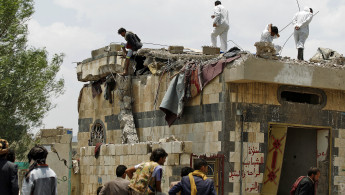'Horrific' scenes after Saudi-led coalition airstrike kills scores of civilians in Yemen
Witnesses said multiple airstrikes had hit Sanaa on Wednesday, including at a housing unit for workers from a nearby qat farm. A television channel run by the Houthis reported more than 30 civilians had been killed.
"Horrific images, death toll expected to rise, so far 35 civilians were killed in Saudi airstrike on Yemen's capital," journalist Saad Abedine tweeted.
According to local journalists, at least four other airstrikes struck the capital overnight in the latest coalition strike on the war-torn nation which has been the site of a civil war between proxies of geopolitical regional rivals for more than two years.
Twitter Post
|
According to UNHCR's Protection Cluster Yemen group, there have been 5,676 airstrikes so far in 2017 – a monthly average of 946.
International rights groups have accused the Saudi-led coalition of bombing civilian areas including public gatherings, markets, hospitals and residential areas across Yemen since the aerial campaign against Houthi rebels began in 2015.
UN figures suggest more than 10,000 people have been killed and thousands more wounded since Saudi Arabia and its allies intervened on behalf of the internationally recognised government.
Twitter Post
|
The airstrikes follow a night of tension after Houthi rebels issued a statement that contained an unprecedented attack on their ally, deposed President Ali Abdullah Saleh, carrying thinly veiled threats against his forces.
While a second Houthi statement appears to have backed down from earlier remarks, tensions still remained high into Wednesday morning.
"(Ali Abdullah) Saleh crossed the red line... and must bear the consequences of what he said, and those who initiate (war) bear the blame," the initial statement said.
Yemeni people will continue to mobilise to strengthen all battlefronts, it added, in an apparent threat against Saleh and his loyalist army.
The initial statement by the Popular Committees, the armed wing of the Houthis, accused Saleh of stabbing them in the back, after he described them as a "militia", criticising their handling of the war and hinting at a divorce in a speech earlier this week.
Signs of a Houthi-Saleh divorce began to emerge this year amid reports of a Saudi-Emirati attempt to co-opt the deposed president to make a deal against his allies in return for returning him or his son and loyalists to power.
Saleh as president had fought successive wars against the Houthis and that could once again become the norm.
The ongoing war, which began with a Saudi-led intervention against Houthi-Saleh rebels, has plunged Yemen into one of the worst humanitarian crises in recent history.
War has also unleashed a deadly cholera epidemic in the country – one which has been described by humanitarian groups as a direct result of the war.





 Follow the Middle East's top stories in English at The New Arab on Google News
Follow the Middle East's top stories in English at The New Arab on Google News
![Israeli forces ordered bombed Gaza's Jabalia, ordering residents to leave [Getty]](/sites/default/files/styles/image_330x185/public/2176418030.jpeg?h=a5f2f23a&itok=_YGZaP1z)

